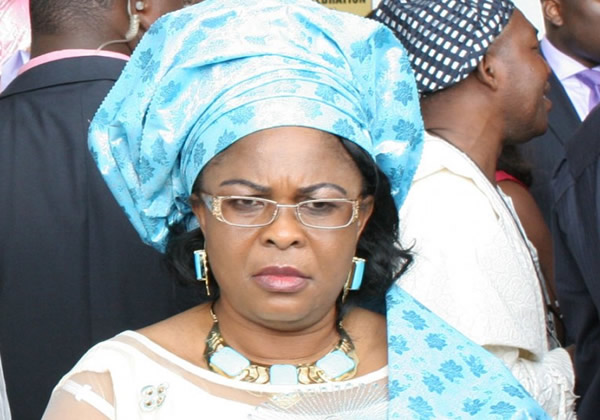- Patience Jonathan Dares EFCC, Recovers N2bn Hotel
Patience, the wife of former President Goodluck Jonathan, has recovered her N2bn hotel which was sealed off by the Economic and Financial Crimes Commission in June.
In June, the EFCC placed the red inscriptions, ‘EFCC Under Investigation’ all over the hotel which is located near Setraco Construction Company, off the Mabushi Kado Expressway.
However, when our correspondent visited the five-storey building recently, the EFCC inscriptions had been covered with patches of grey paint.
When our correspondent knocked on the gate, three men who attended to him said they acted on the instruction of Mrs. Jonathan.
When asked if they had the right to enter the building, one of them said, “Go and ask the EFCC if they had the right to put their sign all over the building in the first place. If you want more information, go and ask madam.”
The spokesman for the EFCC, Mr. Wilson Uwujaren, said he did not know much about the seizure of the building and thus could not say if it had been returned to Patience or not.
He said, “I have spoken to the appropriate people but I was not able to get any answer on the matter.”
A source at the EFCC said it was wrong of Patience to have erased the EFCC inscription from the building.
He said, “Sometimes when we are investigating some politically exposed persons, they immediately begin to sell off their buildings in order to cover their tracks and run away with the cash so that is why we put EFCC signs on the buildings so that innocent people will not buy those buildings.
“As it is, she has removed the inscriptions and can quickly sell it off.”
Although the hotel has not been officially valued by the EFCC, some estate agents within the community told our correspondent that the property should be worth about N2bn.
The property, which has not yet been officially opened, has between 50 and 100 rooms, a gym, a fountain and other amenities.
In his reaction, Mrs. Jonathan’s lawyer, Ifedayo Adedipe (SAN), said he was not aware of the seizure of the property.
Adedipe said if the hotel in question was indeed seized through a court order, then the removal of the EFCC inscriptions would be of no effect.
He, however, boasted that all properties and funds seized from the former first lady would be returned to her soon.
The senior advocate revealed that Mrs. Jonathan had dragged the EFCC before a high court in Abuja and the matter would soon come up for mention.
Adedipe said, “I am not aware of the seizure of property. If the EFCC seal was removed from the property, let them go and put another one. In any case, we have sued the EFCC for abuse of her human rights and human dignity. The matter is pending before the Federal High Court in Abuja and everything has been included in that suit.
“We are challenging all the seizures because without prejudice to our case, Mrs. Jonathan was neither a public officer nor a contractor. So, the idea of harassing her beats my imagination.
“I don’t see the basis for the EFCC’s harassment of that woman and the case wears a political toga because she was a formidable element during the campaign.”
Patience first came under EFCC investigation in May 2016 when the commission arrested a former Special Adviser to the President on Domestic Affairs, Waripamowei Dudafa.
Mrs. Jonathan laid claim to about $15m found in bank accounts allegedly belonging Dudafa’s domestic servants.
She subsequently sued Skye Bank Plc and the EFCC. The commission then went ahead to freeze her personal account with a balance of $5m.
The anti-graft agency had also frozen bank accounts belonging to her relatives and friends including business mogul, Bola Shagaya.
Her husband, Dr. Goodluck Jonathan, had complained about the harassment of his wife by the commission while Patience had also written a petition to the House of Representatives asking the lawmakers to caution the EFCC and stop harassing her and her relatives.


 Forex1 week ago
Forex1 week ago
 Naira4 weeks ago
Naira4 weeks ago


 Naira1 week ago
Naira1 week ago
 Company News4 weeks ago
Company News4 weeks ago


 Naira1 week ago
Naira1 week ago




 Naira3 weeks ago
Naira3 weeks ago
 Billionaire Watch6 days ago
Billionaire Watch6 days ago
 Banking Sector3 weeks ago
Banking Sector3 weeks ago





















